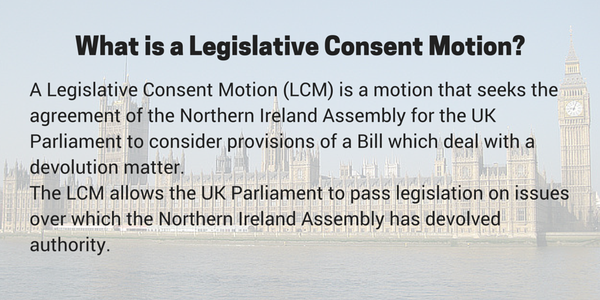I have noticed a slight disagreement between Sinn Fein and the SDLP over the virtues of Margaret Ritchie as Social Development introducing a Welfare Reform Bill under accelerated passage and the current move by the DUP/Sinn Fein to introduce reforms through the Legislative Consent Motion (LCM).
Legislative Consent Motion
So let’s start off with, what exactly is a Legislative Consent Motion? The NI Assembly website says it is…
HOWEVER, a Legislative Consent Motion (governed under Standing Order 42a) usually must go before a committee to receive scrutiny as the order states;
(6) Upon a legislative consent memorandum being laid before the Assembly, those provisions of the Bill dealing with a devolution matter shall stand referred to the appropriate statutory committee unless the Assembly shall order otherwise.
(7) The committee may, within 15 working days from the date of referral, consider those provisions of the Bill which deal with a devolution matter and report its opinion thereon to the Assembly.
(8) A legislative consent motion shall not normally be moved until at least—
(a) 5 working days after publication of the committee report; or
(b) 20 working days after the date of referral to the committee.
But this morning the Assembly suspended this standing order and the motion will pass through without committee scrutiny. It should be noted that according to Twitter, the Northern Ireland Office only published this bill at 10:47am this morning on social media (The debate began in the chamber just after 11am).
NIO today published the draft Welfare Bill and Draft Order as set out in SHA Implementation Plan. https://t.co/mvf5Njch0J
— NIO (@NIOPressOffice) November 18, 2015
The other key question being laid by the SDLP is that Sinn Fein are handing over Welfare Powers to London. From what I can find, they are right in that Westminster will deal with this (although this will be dealt with as an “Order in Council” and is unlikely to even go before the House of Commons). However, in this case, Westminster is only acting upon what the DUP and Sinn Fein have agreed to here.
Although, if the order has powers in it to change things such as benefit caps, then that could have future impacts and would have been likely found if it had gone before a committee.
Accelerated Passage
What is it? Back to the Assembly website;
Under the Accelerated Passage procedure, a Bill can pass all stages in as little as ten days, but in no less time. This process skips the Committee Stage. Accelerated Passage Procedure requires cross-community support within the meaning of the Act.
This was used by the SDLP’s Margaret Ritchie in 2007 in putting through a Welfare Reform bill. This does skip the Committee stage which is an important party of the scrutiny process, but this process is 100% controlled by the Assembly and there is an opportunity for scrutiny at Consideration Stage.
If I have missed anything, please let me know in the comments section….
David McCann holds a PhD in North-South relations from University of Ulster. You can follow him on twitter @dmcbfs
Discover more from Slugger O'Toole
Subscribe to get the latest posts to your email.

